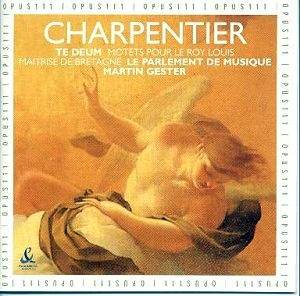Marc-Antoine CHARPENTIER (c. 1645-1704)
Te Deum (H 146)
Motets Pour Le Roi
Louis
 Maitrise de Bretagne; Le Parlement
de Musique
Maitrise de Bretagne; Le Parlement
de Musique
Directed by Martin Gester.
 Opus 111 OPS 30-297
[61:43]
Opus 111 OPS 30-297
[61:43]
Crotchet

Created by the organist and harpsichordist, Martin Gester, with the goal
of researching the interpretation and musical repertoire of the
17th and 18th centuries, Le Parlement de Musique is
an ensemble of vocalists and instrumentalists. The Maitrise de Bretagne is
a regional choir formed under the initiative of the French Minister of Culture
to give students as complete a vocal education as possible.
Charpentier's Te Deum written in the bright key of D major features
a four-part choir and eight soloists. It displays the composer's total command
of religious music combined with a gift for melodic writing. Brilliant and
majestic, yet profound, this Te Deum (Charpentier wrote four Te deums) was
probably composed to celebrate the victory at Steinkerque in August 1692
during the wars against the countries of the League of Augsburg. [The struggle
would eventually be in vain; and Strasburg, and the Palatine succession lost
to France].
Martin Gester's reading shows the work in a rather different light as a perfect
example of the "goût français" that influenced baroque Europe.
Exhilaration is expressed with grace; and the jubilation is in the dance.
This lighter touch results in a performance that touches rather than overwhelms
and charms rather than imposes. Grace is paramount rather than weight or
over-ornamentation.
The opening Prelude of the Te Deum is famous as the signature tune of Eurovision
for the past fifty years. The large choral movements, accompanied by lavish
orchestration, are intermingled with solos or small ensembles of soloists
(duets, trios, and quartets). Three highlights are: the bass solo for the
'Judex crederis', in which vibrant fanfares for the last judgement intersperse
the solo line; the seraphic solo 'Te ergo quaesumus'; and the magnificent
fugue that brings the work to a close.
Although Charpentier worked for Versailles throughout his lifetime, his contacts
with the royal family were relatively rare and never entirely official Yet,
besides the Te Deums, he wrote five works for the feast of St Louis (saint
and fourteenth king of that name). The three motets for King Louis on this
album are: the psalm, Notus in Judeae H.206, In Honorem Sancti Ludovici H.
418 and H.365. The psalm was probably another victory celebration, for the
text mentions war, weapons destroyed by God, the sleep of the enemy dead
and the terror of the final judgement. The first In Honorems also contains
themes of war and victory while the second is more concerned with anguish
and weeping.
Gester's forces communicate very expressively the full range of emotions
contained therein and the playing of the instrumentalists is polished and
refined, and stirring too.
For early baroque music enthusiasts a firm recommendation
Ian Lace


